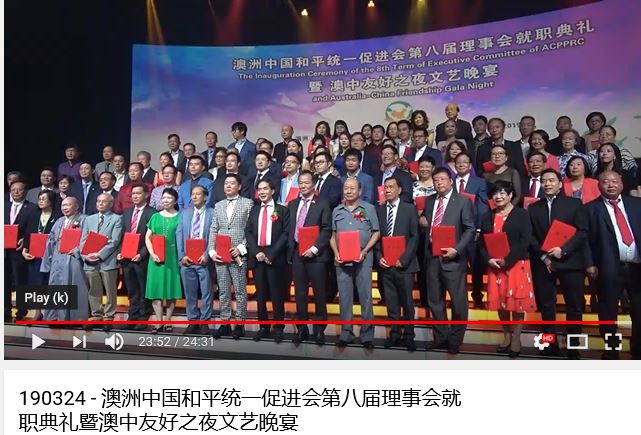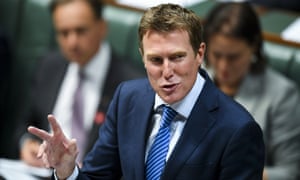Chinese Communist party-linked group not listed on foreign influence register
The Australian Council for the Promotion of the Peaceful Reunification of China denies it is a Communist party arm
May 20 2019
A group closely linked to the Chinese Communist party has not declared itself on the federal government’s new foreign influence register, prompting criticism from China experts.
Only 25 groups or individuals have declared themselves on the government’s foreign influence transparency register, designed to make public the identity of foreign government agents attempting to influence Australian democracy.
The Australian Council for the Promotion of the Peaceful Reunification of China ...has not yet listed on the register.

Experts say the council is the Australian arm of a foreign influence network overseen by the Chinese Communist party’s united front work department, although the council disputes any such link.
The Australian parliament and US Congress have been warned that the councils try to influence foreign democracies, and they are connected with the Chinese Communist party, answering to the Beijing-based Council for the Promotion of the Peaceful Reunification of China. Academics say it is in turn subordinate to the united front work department of the party’s central committee.
In Australia, the council has come under close scrutiny for interactions with the former Labor senator Sam Dastyari, who parroted Beijing lines on the South China sea. Its former chairman Huang Xiangmo, a political donor, had his passport application blocked and permanent residency cancelled over foreign influence concerns.
Huang has previously rejected suggestions that the organisation was part of the united front department. He told the ABC it was an “autonomous, non-government organisation” that “supports economic and cultural exchange programs and charitable causes”.Last month Guardian Australia revealed how figures linked to the council continue to donate to major political parties, including to the NSW Liberals in the lead-up to the recent state election.
The council did not respond to queries about whether it intended to place itself on the new transparency register. The attorney-general’s department confirmed it had not registered.
An Australian Strategic Policy Institute researcher, Alex Joske, said the policy underpinning the transparency laws suggested it should be on the register.
Joske, an expert on China, said the omission showed the register was weak unless backed with enough political will and resourcing.
“I think there’s definitely an issue with not enough organisations registering,” he said. “We’ve seen very similar issues in the US, where insufficient resourcing and political emphasis was placed on their foreign influence registration act, which ours is modelled on.
“I think the Australian Council for the Promotion of the Peaceful Reunification of China should be registering because it’s essentially a foreign principal in itself. It’s fair to say that it’s a branch of the Council for the Promotion of the Peaceful Reunification of China, which is in turn officially designated as a work unit for the united front department.”
The attorney general, Christian Porter, said that, initially at least, it was up to individual groups whether they believe they were required to register. The government could later compel registration.
“If an entity or individual hasn’t registered and there’s a reasonable belief that their activities require registration, there’s a range of actions through the secretary of the attorney-general’s department which can be taken,” Porter said.
Such action included issuing a “transparency notice”, which declares an individual or organisation to be linked to a foreign state.
Failure to register could also attract significant penalties.
“Of course now that the grace period has come to a close, a range of organisations are being considered in this regard,” he said.

No comments:
Post a Comment
Comments always welcome!